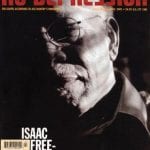Caitlin Cary – Dark horse
After a four-year detour to Houston with a college boyfriend, she enrolled at North Carolina State University’s graduate writing program in 1994. She came to Raleigh because the N.C. State faculty included author Lee Smith, whose books include The Devil’s Dream (the history of a fictional country-singing clan similar to the Carter Family), Oral History and Fair And Tender Ladies.
“She’s a great inspiration, but she’s not actually the greatest teacher,” Cary says of Smith. “She’s one of these disgusting people that stories just fall out of. She’s a great character, and writing seems just effortless for her. This whole thing of redrafting and rewriting, she just doesn’t have to do too much of that.”
Maybe it’s no coincidence Cary wound up playing in a band with someone very much like that.
“Yeah, it’s like the difference between me and Ryan as songwriters,” she says. “I have to work my ass off, writing and rewriting everything, but not him. I was always trying to bring this sort of writers-workshop ethos to it — ‘C’mon, Ryan, it can’t be that easy!’ — but he’d have no part of it.”
As a singer, though, Cary is clearly a natural. Her voice is simply exquisite throughout While You Weren’t Looking, recalling Linda Thompson in its dusky tones. Singing comes across as perfectly effortless for Cary, which disguises how much hard work went into it.
“She sings like she knows who she is and what she’s singing about,” says Stamey. “That’s what makes her so compelling. It’s not vocal acrobatics. Her singing has a quality of inevitability, of being centered. But it’s not as easy as it sounds on the record. She worked really hard to get each song to where it felt emotionally right to her.”
Cary finished all her coursework at N.C. State, but never earned her graduate degree because she has yet to finish writing her thesis. At this point, she doubts she ever will — “maybe when I’m 50, but not now,” she says.
Indeed, one thing she learned from school is that she’s not an author. “I’d been the best student in my undergraduate program, got a lot of awards and praise. But that’s kind of like being told you’ll be president someday when you’re in kindergarten. Now I do borrow from myself, good lines I steal from my stories to put into songs, like that line in ‘Fireworks’ — ‘I kissed him in the glow’ — but it’s a different discipline.
“I like the social part of writing music, working with other people, and literary writing is so alone. And I’ll tell you, I know more about plot from writing songs than I ever did from short stories. It’s easier to get that plot across, somehow, although I don’t know why.”
Whiskeytown had also turned into a full-time proposition right about the time she needed to write her thesis. She joined the band at Adams’ invitation; he sought out Cary because he was looking for a fiddle player. Early on, she didn’t even sing — until she mentioned at practice, “You know, I can sing harmony if you want.” Adams and Cary’s vocal harmonies soon became one of their band’s hallmarks.
By Whiskeytown’s 1995 debut album Faithless Street, Cary was most recognizable for her signature star turn “Matrimony”, a defiant song about a woman determined to be no man’s wife. So it’s amusingly ironic that Cary wound up happily married to the band’s drummer. (One of Whiskeytown’s most memorable onstage moments came on New Year’s Eve 2000, when Adams serenaded then-recently engaged Cary and Gilmore with a very Jagger-esque version of “Matrimony”; nine months later, Cary sang the song at her own wedding reception.)
“I’ve always said that ‘Matrimony’ is not about my parents, who have a real happy marriage,” Cary says. “But I went through a really bruising breakup and had a few years of hating men and the idea of relationships. That song was written during that time, when I was thinking I’d never care to do that again. It’s funny how many people have come up to me over the years to say that ‘Matrimony’ got them through a breakup — ‘I love that song, I just got divorced from a total bastard and that song really carried me through it.'”




